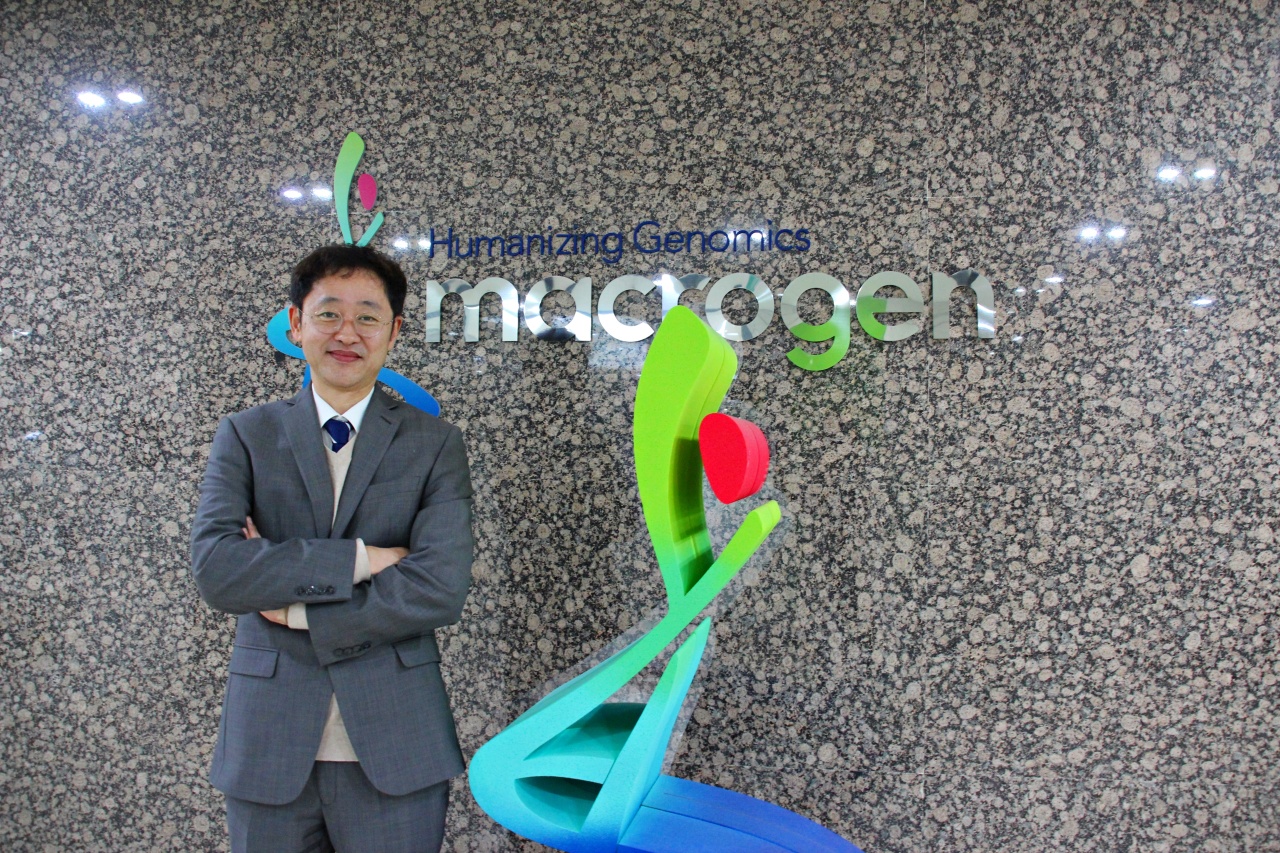 |
Macrogen CEO Yang Kap-seok poses at the company headquarters in Guro-gu, Seoul. (Lim Jeong-yeo/The Korea Herald) |
A human life is not only determined by the genomic structure, but also by what types of viruses and microbiomes the body interacts with.
CEO Yang Gap-seok of Macrogen, a company that has recently been touted as an essential cogwheel in the research to understand the novel coronavirus, says that what COVID-19 is doing will affect our short-term evolution.
The company Yang represents has been leading the research for the virus specific to Korea.
Macrogen was the first to identify nine mutations in SARS-CoV-2 -- the coronavirus that causes COVID-19 -- found in a confirmed patient in Korea.
The ever-mutating coronavirus had shifted forms on Korean soil, now matching 99.7 percent, or mismatching 0.3 percent, the genome of the virus identified in China.
Using this information, Macrogen has been producing diagnostic agents for domestic and global companies manufacturing coronavirus diagnostic kits. The company is unable to open the exact number of these partners, but said that they are included in the total of 57 companies receiving oligonucleotide synthesis service. More broadly, Macrogen has some 18,000 clients across 153 countries.
“In order to make a diagnostic kit, you must know the virus‘ genomic structure,” said Yang, who holds a Ph.D. in microbiology from Seoul National University in Korea. “The more blood samples you have from confirmed patients the better, because you can study various more mutations.”
Since the first confirmed case in Korea on Jan. 20, Macrogen has been working through weekends to meet demand from diagnostic kit manufacturers and for the research it is jointly carrying out with governmental bodies and academic institutions, according to Yang.
The company is supplying a wider range of research houses with genetically modified lab mice for preclinical trials of COVID-19 drugs. Macrogen is the only company in Korea that is able to produce lab mice specifically altered to react more sensitively to SARS-CoV-2, Yang said.
“We are pursuing follow-up studies of the virus to contribute to the development of a vaccine or treatment,” said Yang.
Macrogen has the capability to perform whole genome sequencing of some 300,000 people annually. It also has a computing system that can save 30 petabytes of digital information for genomic information-based precision medicine big data.
The company has around 80 patents for biomarkers, microarray kits, lab mice and blockchain technology, and has applied for 20 additional patents that are undergoing evaluation.
Biomarkers are genetic traits that are precursors to specific diseases. The latest biomarker patent Macrogen acquired was in Europe, for the gene that causes adenocarcinoma of the lung.
“2020 will be a critical year for us where we expand our business to clinical trial sample analysis and globally launch our original in vitro breast cancer diagnostic agent,” Yang said.
“For individual genome analysis service for patients wishing to know their own genetic and physical characteristics in the well-being area, we have jointly acquired US’ microbiome company uBiome with Australia‘s Microba,” said Yang.
A newly purchased building in Gangnam will also provide more accessibility to direct customers of Macrogen’s.
“It gives me the greatest joy when the information we provide to our customers shows them how they can maneuver through their innate, genomic nature to make informed decisions for their medical choices,” Yang said.
Macrogen‘s revenue in 2019 was 122.3 billion won ($97 million). The goal for 2020 is to earn revenues of over 160 billion won.
By Lim Jeong-yeo (
kaylalim@heraldcorp.com)








